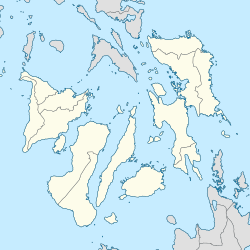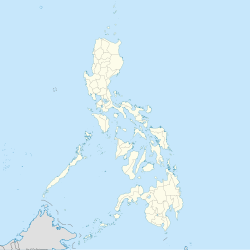Aklan State University
Pamantasang Pampamahalaan ng Aklan (Filipino) | |
 | |
Former names | |
|---|---|
| Motto | A leading university in the Asia-Pacific Region for global competitiveness and sustainable development |
| Type | Public State Co-educational Non-profit Research higher education institution |
| Established | 1917[1] |
| Chairman | J. Prospero E. De Vera, III |
| President | Jeffrey A. Clarin, DIT |
| Vice-president |
|
| Location | , , Philippines 11°37′58″N 122°19′42″E / 11.6327°N 122.3284°E |
| Campus | List
|
| Colors | ASU Green ASU Gold ASU Orange ASU Pale Yellow |
| Website | asu |
Aklan State University (ASU; Filipino: Pamantasang Pampamahalaan ng Aklan) is a provincial state university in Aklan province, Philippines. Its seat of governance is in ASU - Banga, with four other campuses across the province. ASU focuses on agriculture, fishery, arts and sciences, engineering and technology, and education.
Formerly known as the Aklan State College of Agriculture and the Aklan Agricultural College, the institution gained university status on April 4, 2001, with the signing of Republic Act 9055 by President Gloria Macapagal Arroyo.[4]
Mandate
[edit]
ASU is mandated primarily to provide advanced instruction and professional training in agriculture, science and technology, education, and other related fields, undertake research and extension services, and provide progressive leadership in these areas,[4] provided that the university does not stray from its original mandate as a primarily agricultural institution.
As depicted in its official logo, the university has a four-pronged function: instruction, research, extension, and production.
Campuses
[edit]
ASU - Banga
[edit]The university's biggest campus is located in Banga, occupying 100 hectares (1,000,000 m2) of land below Manduyog Hill, a tourist attraction famous for its life-sized Way of the Cross.
ASU - Banga is home to the College of Agriculture, Forestry, and Environmental Science (CAFES), College of Teacher Education (CTE), College of Business and Management (CBM, formerly the School of Management Sciences or SMS), College of Arts and Sciences (newly converted into a college, formerly the SAS), College of Nursing (newly created college, formerly under the SAS), and the School of Veterinary Medicine (SVM).
The campus has a swimming pool, dormitories, and a university hotel that also caters to non-ASU guests. It also houses the Regional Center for Climate Change (RCCC), the Akeanon Studies Center for Heritage, Diversity, and Educational Innovation, and the Natural Fiber Technology Resource Center (NFTRC).
Several national agencies also have their regional and provincial offices within the campus under usufruct agreements, such as the Agricultural Training Institute (ATI) - Regional Training Center VI, the Civil Service Commission - Aklan Field Office, and the Bureau of Fire Protection - Office of the Aklan Provincial Fire Marshal.
ASU - Kalibo
[edit]The campus in Kalibo, the provincial capital of Aklan, is home to the College of Industrial Technology (CIT), College of Industrial Education (CIE), College of Computer Studies (CCS), and College of Engineering and Architecture (CEA), formerly known as School of Industrial Technology. Located in Andagao, a busy area in Kalibo, ASU-Kalibo is the smallest of the five campuses, occupying 8 hectares (20 acres), yet has the second-biggest number of students enrolled and the highest income earner among the five ASU campuses.
Before its integration into ASCA in 1999 and eventually becoming the College of Industrial Technology of Aklan State University, it was a separate institution known as the Roxas Memorial School of Arts and Trades (RMSAT) established in 1960 by virtue of Republic Acts 1952 and 2417[5][6] authored by Cong. Hon. Godofredo P. Ramos and Cong. Jose B. Legaspi, respectively. On June 10, 1983, RMSAT became a national college by virtue of Batas Pambansa Blg. 471 authored by Assemblyman Jose T. Tumbokon. RMSAT since then became known as the Roxas Memorial College of Arts and Trades (RMCAT).[7]
ASU - Ibajay
[edit]The campus in Ibajay is home to the College of Hospitality And Rural Resource Management, formerly known as the School of Rural Resource Development and Management. Located in Colongcolong, the campus occupies 25 hectares (62 acres) of land.
Before its integration into ASCA in 1999 and eventually becoming the College of Hospitality And Rural Resource Management of Aklan State University, it was a separate institution known as the Ibajay National Agricultural and Industrial School (INAIS), established in 1965 as a feeder school of Aklan Agricultural College by virtue of Republic Act 4486 authored by Cong. Rafael B. Legaspi.[8] On December 16, 1994, INAIS was converted into a polytechnic college by virtue of Republic Act No. 7838 authored by Cong. Allen S. Quimpo, known as the Western Aklan Polytechnic College (WAPC).[9]
ASU - New Washington
[edit]The campus in New Washington is home to the College of Fisheries and Marine Sciences, formerly known as the School of Fisheries and Marine Sciences, and occupies 13 hectares (32 acres) of land.
Before its integration into ASCA in 1999 and eventually becoming the College of Fisheries and Marine Sciences of Aklan State University, it was a separate institution established as New Washington Junior High School in 1948 and later New Washington High School when it progressed to complete secondary course.[10] It was converted into Aklan National School of Fisheries in 1957 by virtue of Republic Act 1931[11] and into Aklan National College of Fisheries by virtue of Republic Act 3944.[12] Both are authored by Cong. Godofredo Ramos.
ASU - Makato
[edit]The campus in Makato originally served as an extension high school, and was thus called the ASU Annex, before becoming known as ASU - Makato, an extension of ASU - Banga, and as such, under its administration. As of 2022, the Makato extension is home to the College of Human Development and Performance Sciences (formerly the Teacher Education Center), and occupies 10 hectares (25 acres) in Barangay Calangcang.
Before its integration into ASCA in 1999 and eventually becoming the Teacher Education Center of Aklan State University (under the umbrella of the College of Teacher Education in Banga campus), it was a separate institution known as the Northern Panay Teachers College (NPTC) established in 1966 by virtue of Republic Act 4711 authored by Cong. Rafael B. Legaspi.[13]
Schools and colleges
[edit]- ASU - Banga
- College of Agriculture, Forestry, and Environmental Sciences
- Master in Animal Science
- Master in Crop Science
- Master in Rural Development
- Bachelor of Science in Agriculture (Center of Development[14])
- Bachelor of Science in Forestry
- Bachelor of Agricultural Technology
- Bachelor of Science in Home Technology
- Bachelor of Science in Food Technology
- College of Teacher Education
- Doctor of Philosophy
- Master of Arts in Education
- Bachelor of Secondary Education
- Bachelor of Elementary Education
- College of Business and Management
- Master in Public Administration
- Bachelor of Public Administration
- Bachelor of Science in Office Administration
- Bachelor of Science in Business Administration
- Bachelor of Science in Entrepreneurship
- College of Arts and Sciences
- Bachelor of Arts in Communication
- Bachelor of Arts in English Language Studies
- Bachelor of Science in Applied Mathematics
- Bachelor of Science in Biology
- College of Nursing
- ASU - Kalibo
- Bachelor of Science in Hospitality Management
- College of Industrial Technology
- Bachelor of Science in Industrial Technology
- Architectural Drafting Technology
- Automotive Technology
- Electrical Technology
- Electronics Technology
- Mechanical Technology
- Civil Technology
- Bachelor of Industrial Technology
- Apparel and Fashion Technology
- Beauty Care and Wellness Technology
- Culinary Technology
- Bachelor of Science in Industrial Technology
- College of Industrial Education
- Master of Arts in Education
- Bachelor of Technical-Vocational Teacher Education
- Electronics Technology
- Electrical Technology
- Beauty Care and Wellness
- Hotel and Restaurant Services
- Fodd Service Management
- Computer System Servicing and Programming
- College of Computer Studies
- Bachelor of Science in Information Technology
- Bachelor of Science in Information System
- Bachelor of Science in Entertainment and Multimedia Computing
- College of Engineering and Architecture
- Bachelor of Science in Architecture
- Bachelor of Science in Civil Engineering
- ASU - Ibajay
- College of Hospitality and Rural Resource Management
- Master in Tourism Management
- Bachelor of Science in Environmental Science
- Bachelor of Science in Computer Science
- Bachelor of Science in Hospitality Management
- Bachelor of Science in Tourism Management
- Bachelor of Elementary Education
- Bachelor of Secondary Education
- ASU - New Washington
- College of Fisheries and Marine Sciences
- Master of Arts in Education
- Bachelor of Culture and Arts Education
- Bachelor of Secondary Education
- Bachelor of Science in Criminology
- Bachelor of Science in Customs Administration
- Bachelor of Science in Fisheries
- Bachelor of Science in Hospitality Management
- Bachelor of Science in Marine Biology
- ASU - Makato
- College of Human Development and Performance Sciences
- Bachelor of Technology and Livelihood Education
- Bachelor of Physical Education
- Bachelor of Science in Exercise and Sports Science
Governance and administrative structure
[edit]The key stakeholders of ASU make up its Board of Regents, chaired by the Commissioner of the Commission of Higher Education and vice-chaired by the University President. The members of the Board include the Chairman of the House Committee on Higher and Technical Education, the Chairman of the Senate Committee on Education and Culture, the Undersecretary for R&D of the Department of Science and Technology, the Assistant Director General from the National Economic and Development Authority (NEDA), two representatives from the private sector, and the three presidents of the federations of associations in ASU composed of the Alumni Association, the Faculty Association, and the Federation of University Student Council.
| Name | Position |
|---|---|
| Dr. Jeffrey A. Clarin | President |
| Dr. Eleanor F. Rosales | Vice President for Academic Affairs |
| Dr. Anna Mae C. Relingo | Vice President for Administration |
| Prof. Julie Ann Salido | Vice President for Research and Extension |
References
[edit]- ^ a b c "History". Aklan State University. Archived from the original on 19 December 2017. Retrieved 22 August 2020.
- ^ "Republic Act No. 3439". The LawPhil Project. 18 June 1961. Archived from the original on 22 August 2020. Retrieved 22 August 2020.
- ^ "R.A. No. 7371". The Corpus Juris. 10 April 1992. Archived from the original on 22 August 2020. Retrieved 22 August 2020.
- ^ a b c "Republic Act No. 9055". Official Gazette of the Republic of the Philippines. 4 April 2001. Archived from the original on 22 August 2020. Retrieved 22 August 2020.
- ^ "REPUBLIC ACT NO. 1952". Chan Robles Virtual Law Library. 22 June 1957. Archived from the original on 9 September 2019. Retrieved 22 August 2020.
- ^ "R.A. No. 2417". The Corpus Juris. 21 June 1959. Archived from the original on 22 August 2020. Retrieved 22 August 2020.
- ^ "Batas Pambansa Bilang 471". Chan Robles Virtual Law Library. 10 June 1983. Archived from the original on 22 August 2020. Retrieved 22 August 2020.
- ^ "Republic Act No. 4486". Chan Robles Virtual Law Library. 19 June 1965. Archived from the original on 9 September 2018. Retrieved 22 August 2020.
- ^ "Republic Act No. 7838". Official Gazette of the Republic of the Philippines. 16 December 1994. Retrieved 22 August 2020.
- ^ "ASU-CFMS History". Aklan State University. Archived from the original on 6 April 2018. Retrieved 22 August 2020.
- ^ "Republic Act No. 1931". The LawPhil Project. Archived from the original on 22 August 2020. Retrieved 22 August 2020.
- ^ "Republic Act No. 3944". The LawPhil Project. 18 June 1964. Retrieved 22 August 2020.
- ^ "Republic Act No. 4711". The LawPhil Project. 18 June 1966. Archived from the original on 22 August 2020. Retrieved 22 August 2020.
- ^ "Region 6" (PDF). ched.gov.ph. October 2017.
External links
[edit] Media related to Aklan State University at Wikimedia Commons
Media related to Aklan State University at Wikimedia Commons- Official website


